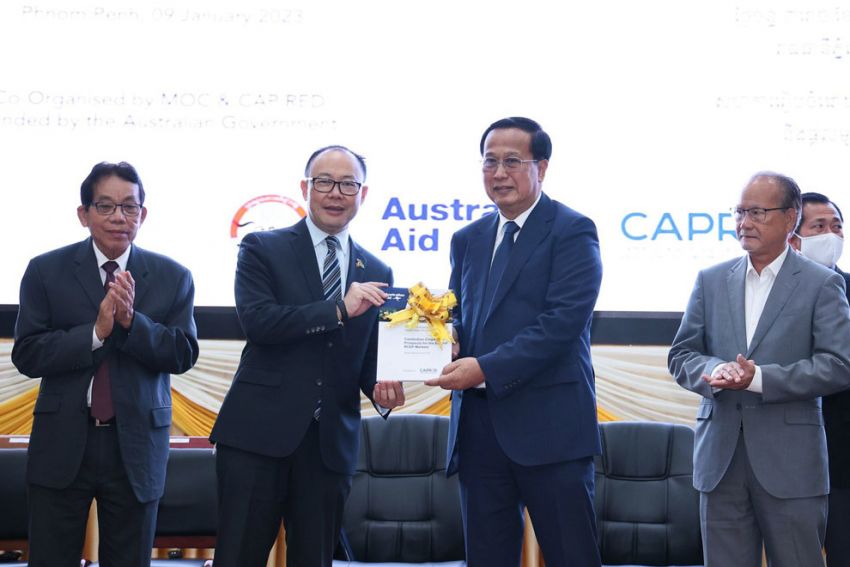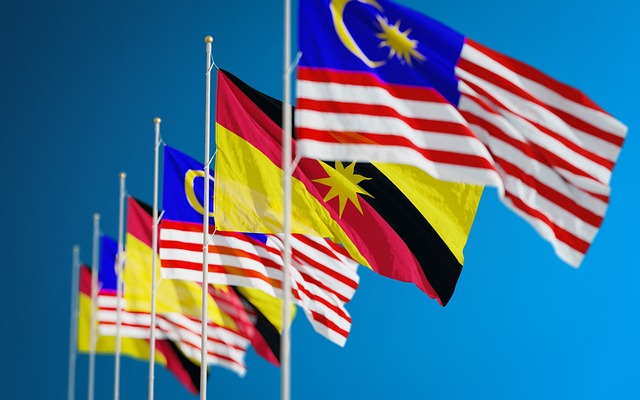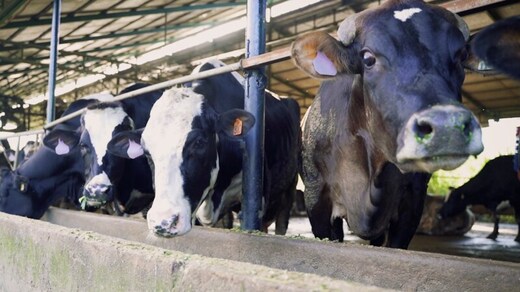Cambodia’s total merchandise exports reached $22.483 billion in 2022, rising by 16.44 per cent over 2020, narrowing its international trade deficit by 20.60 per cent to $7.459 billion, according to the General Department of Customs and Excise (GDCE).
The 2022 international merchandise trade came in at $52.425 billion, up 9.19 per cent on a yearly basis, with imports accounting for $29.942 billion, up 4.32 per cent.
GDCE figures show that exports have increased each year since at least 2016 – 16.71 per cent in 2016, 13.01 per cent in 2017, 12.54 per cent in 2018, 16.79 per cent in 2019, 24.36 per cent in 2020, 5.27 per cent in 2021, and most recently, 16.44 per cent or nearly one-sixth in 2022.
Cambodia Chamber of Commerce vice-president Lim Heng believes that the trend will continue in 2023, as the Kingdom’s bilateral and multilateral free trade agreements (FTA) and preferential trade arrangements with the EU and US springboard local products into the international marketplace.
He also assured that the trade deficit is not a significant cause for concern, arguing that imports largely comprise raw materials and components used in the production of export goods, or in the construction of infrastructure aimed at promoting investment in the Kingdom.
“I believe that revenues from Cambodia’s exports will continue to increase in 2023, as the number of new investment projects keeps ticking up,” Heng said.
Hong Vanak, director of International Economics at the Royal Academy of Cambodia, remarked that the double-digit increase in merchandise exports underscores the relative strength of the Cambodian economy, despite the stagnation seen elsewhere as a result of Covid-19, elevated oil prices, the Ukraine conflict, and geopolitical conflicts between major powers.
For full article, please read here
Author: Hin Pisei
Source: The Phnom Penh Post
Publication date: 10 January 2023
The Cambodian Ministry of Commerce and the Australian Embassy, along with relevant institutions, on 9 January co-launched two key market research publications and a Single Digital Platform development project.
It is hoped the market information booklets – Cambodian Crops with Prospects for the EU and RCEP Markets and Cambodia and Unlocking Global Markets by Leveraging Free Trade Agreements (FTA) – will serve as guides to unlock long-term benefits for Cambodia’s agricultural sector.
Minister of Commerce Pan Sorasak said Cambodian Crops with Prospects for the EU and RCEP Markets offer important insights into market demand, consumer preferences, sanitary and phytosanitary biosecurity measures, non-tariff barriers to trade, product utilisation, key competitors and potential windows of opportunity.
“Promising crops included in this report are fresh mango, cashew, chilli, sweet potato, palm sugar, avocado, sesame and processed fruits.
“This information, if used strategically, has the potential to generate long-term benefits for Cambodian agriculture,” Sorasak said.
The Cambodia and Unlocking Global Markets by Leveraging Free Trade Agreements booklet provides up-to-date and easy-to-understand information on the bilateral and regional free trade agreements Cambodia is a signatory to, such as RCEP, the Cambodia-China FTA and the Cambodia-Korea FTA, he added.
“The booklet will help agri-food enterprises, producers, exporters, business associations and other relevant stakeholders to access market diversification opportunities and enjoy the benefits of these FTAs,” Sorasak said.
The Single Digital Platform will emulate Australia’s own FTA portal and act as a comprehensive resource for exporters and importers exploring the benefits of Cambodia’s FTAs.
According to the ministry, the platform will also provide information on rules of origin, procedures to register as an exporter and the ability to obtain certificates of origin.
For Authentic Article, Please read here
Author: Sem Pisei
Source: The Phnom Penh Post
Source : Malay Mail
Source : The Borneo Post
Depending on to the Government-to-Government pact between Myanmar and Bangladesh, Myanmar has conveyed over 165,000 tonnes of white rice to Bangladesh, according to the Ministry of Commerce. Myanmar and Bangladesh inked a Memorandum of Understanding (MoU) on rice trade on 8 September this year.
As stated by this MoU, Bangladesh has agreed to buy 250,000 tonnes of white rice and 50,000 tonnes of parboiled rice from Myanmar between 2022 and 2027.
Following the MoU, Bangladesh’s Directorate General of Food and Myanmar Rice Federation signed a sales contract for 200,000 tonnes of Myanmar’s white rice (five per cent broken) to be exported to Bangladesh.
According to the sales contract, Myanmar has exported over 165,000 tonnes of white rice to Bangladesh as of 2 January 2022. The remaining will be delivered by the deadline.
As per the MoU between Myanmar and Bangladesh on the rice trade, 48 companies, under the supervision of the Myanmar Rice Federation, are to export 200,000 tonnes of rice to Bangladesh with Chinese yuan payment between October 2022 and January 2023. See detailed more the following link… https://www.gnlm.com.mm/myanmar-ships-over-165000-tonnes-of-rice-to-bangladesh-under-g-to-g-pact/
Author: NN/EMM
Source: The Global New light of Myanmar
Published date: 7.1.2023
THE shortage of biotech talent in Singapore is set to widen by 29.2 per cent over the next decade as the sector expands, according to a report released by deep tech investor SGInnovate on Monday (Dec 19).
Authored by global strategy firm LEK Consulting, the report forecasts that the number of biotech companies in Singapore will grow by over 61.5 per cent between 2022 and 2032, from 52 to 84.
The number of clinical-phase companies is expected to more than double to 36 in the next 10 years, while those in the commercial phase are expected to grow from three to nine. The number of pre-clinical companies, which has grown rapidly since 2012, is expected to stand at 39 in 2032.
Singapore's growing biotech scene
Biotech startups are a key engine of innovation, as global pharma companies pursue a strategy of acquiring, co-developing with or licensing therapeutics from smaller biotech companies. While the outlook for Singapore as a biotech hub is positive, talent is a key constraint.
The shortage in the number of personnel is set to grow 30 per cent, from 154 in 2022 to 199 in 2032, the report predicts. Key roles facing the shortage include research and development, production, regulatory affairs and business management.
Projected biotech talent gap in Singapore
It is mainly biotech companies in the clinical stage that are set to face shortages, across junior, manager and C-suite roles. The gap is most critical at the C-suite level, with the need for professionals that can support business management activities such as fundraising and business direction.
Managers who drive vendor and third-party engagement would also be in shortage.
In contrast, the talent gap is expected to narrow for pre-clinical companies, as research professionals flock to these companies for hands-on industry experience with these early-stage players, the report said.
To address the talent crunch, the report recommends that biotech companies accelerate career progression for experienced juniors reaching managerial level, through rotations and secondments. Incentives could also be provided for talent to relocate from overseas.
Meanwhile, biotech companies should be incentivised to conduct their phase II and III clinical trials locally, to allow professionals to gain experience with industry-level operations. Phase II trials involve testing a drug in a larger group, while phase III trials compare the safety and efficacy to existing treatments, before commercialisation.
“Singapore can also position itself as a facilitating hub for trials in the Asia-Pacific region, especially for local and overseas biotech companies that target this market,” the report said.
It also suggested that pre-clinical research organisations could be set up in Singapore, to provide professionals with opportunities to manage the outsourcing of experiments in pre-clinical settings.
SGInnovate will work with industry stakeholders to support biotech talent development based on the report’s insights, said Juliana Lim, the organisation’s executive director for talent.
“While the talent gap remains a perennial issue for biotech companies globally, the demand for expertise in these areas presents an opportunity for researchers and academia to gain industry exposure,” she added.
Source: The Business Times. Link Here.






















